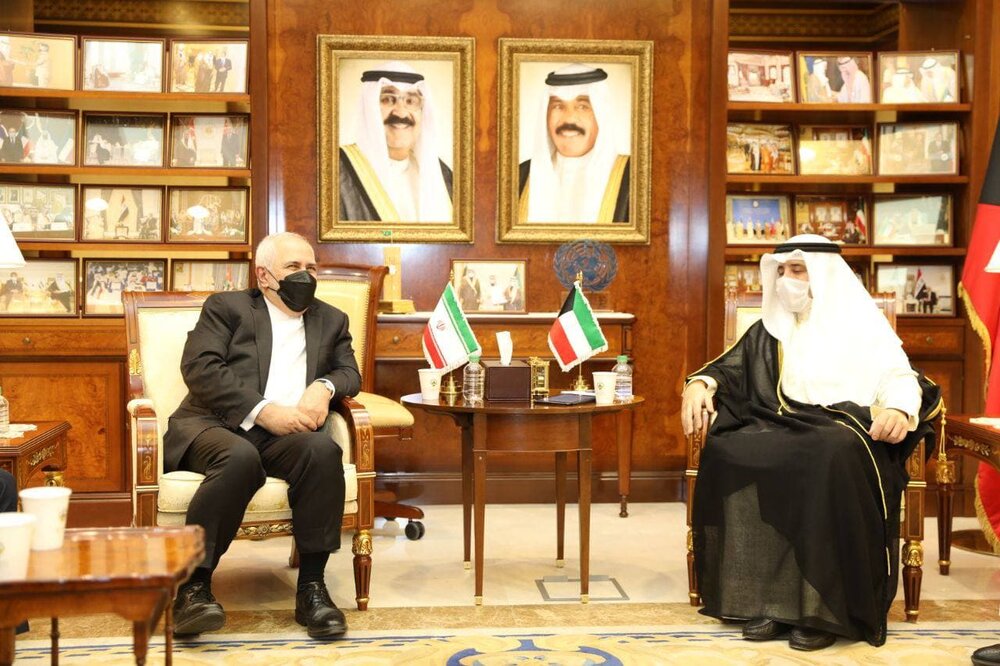Foreign Minister holds week-long regional tour

TEHRAN—Iranian Foreign Minister Mohammad Javad Zarif continued his regional tour by visiting Oman on Wednesday, April 28 and Kuwait on April 29.
Zarif went to Qatar and met with Qatar's Emir, Sheikh Tamim bin Hamad Al Thani, and his Qatari counterpart, Mohammed bin Abdulrahman bin Jassim Al Thani.
During his meetings with the Qatari officials, Zarif discussed the approaches to the Hormuz Peace Endeavor (HOPE) and stressed that "Neighbors are Iran's priority."
Excellent consultations with my brothers H.H. Emir of Qatar @TamimBinHamad & DPM/FM @MBA_AlThani_ on expansion of constructive bilateral relations & enhanced coordination on regional & global issues.#HOPE initiative is Iran's approach to the region.
— Javad Zarif (@JZarif) April 25, 2021
Neighbors are our priority. pic.twitter.com/Gw9KFiMUZx
"Excellent consultations with my brothers H.H. Emir of Qatar @TamimBinHamad & DPM/FM @MBA_AlThani_ on the expansion of constructive bilateral relations & enhanced coordination on regional & global issues. #HOPE initiative is Iran's approach to the region. Neighbours are our priority," he tweeted on Monday.
'Busy days in Iraq'
Zarif arrived in Baghdad on Monday for the second leg of his regional tour and was greeted at Baghdad International Airport by Iraqi deputy Foreign Minister Nazar Khairallah, some officials from the prime minister's office, Iran's ambassador to Baghdad, and some Iranian diplomats in Iraq.
Zarif met with his counterpart Fuad Hussein. He called for Iraq to play a more prominent role in the Middle East, praised the Arab country's importance in the area, and expressed Tehran's hope that Baghdad's role would result in positive developments in the region.
In a meeting with Iraqi President Barham Salih on Monday, Zarif emphasized Iraq's influential position in the region while describing Iran's perspective on regional stability, which has already been introduced to the world in the context of HOPE.
He also met with Ammar Al-Hakim, head of the Hikma National Movement, Nouri Al-Maleki, Leader of the State of Law Coalition, Adil Abdul-Mahdi, former Iraqi Prime Minister, and Qassim Al-Araji, Iraqi National Security Advisor.
He then went to the Kurdistan Region to meet the leader of the Kurdistan Democratic Party, Masoud Barzani, Masrour Barzani, Prime Minister of the Kurdistan Region, Qubad Talabani, Deputy Prime Minister of the Kurdistan Region, Nechirevan Barzani, President of the Kurdistan Region, and Bafel Jalal Talabani, Co-President of the Patriotic Union of Kurdistan.
According to Zarif's tweet, "extensive consultations" happened at the numerous meetings in Iraq.
'Iran thanks Oman for having a positive mediatory role in the Iranian foreign affairs'
After he visited Qatar and Iraq, Zarif arrived at the Omani capital of Muscat to discuss regional and bilateral issues.
He was welcomed by his Omani counterpart, Sayyid Badr bin Hamad bin Hamood Al Busaidi and Iranian Ambassador Ali Najafi.
According to Iranian Foreign Ministry spokesman Saeed Khatibzadeh, the intention of Zarif's visit to Oman is to hold talks on Tehran-Muscat relations and their cooperation on regional issues.
In a meeting with Fahd bin Mahmoud Al Saeed, Deputy Sultan of Oman, the Iranian Foreign Minister discussed the latest developments in relations between the two countries and regional issues of mutual interest.
During the meeting, the two sides emphasized the distinctive relations between Iran and Oman based on the will of the leaders of the two countries and their determination to remove
Excellent meetings in Muscat w/ Omani friends.
— Javad Zarif (@JZarif) April 29, 2021
Fruitful talks/ w H.H. Fahad bin Mahmoud, FM @badralbusaidi, Royal Min. Numani, former FM Yousuf bin Alawi.
Focus: Enhanced bilateral, regional & global coordination
Disscussed Yemen w/ Omanis & @abdusalamsalah
Next stop: Kuwait pic.twitter.com/gv0jZYnH2m
obstacles and speed up the decisions taken by the high officials of the two countries.
"Excellent meetings in Muscat w/ Omani friends. Fruitful talks/ w H.H. Fahad bin Mahmoud, FM @badralbusaidi, Royal Min. Numani, former FM Yousuf bin Alawi. Focus: Enhanced bilateral, regional & global coordination. Discussed Yemen w/ Omanis & @abdusalamsalah
Next stop: Kuwait," he tweeted on Thursday.
According to Zarif's tweet, he also discussed the Yemeni crisis Mohammed Abdul Salam, Houthi spokesman.
In a statement, the Iranian foreign minister said, "once again stressed our country's view regarding the political solution being the only solution to the crisis of Yemen."
He added that Iran supports ceasefire and Yemeni-Yemeni dialogue.
Yemen's war, which has killed tens of thousands of people since it erupted in 2014, has flared up again in the last two months with a rebel attempt to retake Marib city, the government's last stronghold in the north.
Saudi Arabia has suggested a "comprehensive" truce and a return to the negotiation table, which the Houthis immediately refused, claiming that the country's blockade must first be lifted.
Riyadh accuses Iran of arming the insurgents and assisting them in creating drones used to invade the kingdom.
Tehran rejects the claims, claiming that its support for the Houthis is purely political.
'Positive signs in Kuwait'
He then stopped at Kuwait, meeting with the Kuwaiti Prime Minister, Sabah Al-Khalid Al-Sabah, discussing HOPE.
He also met Kuwaiti Foreign Minister Sheikh Ahmad Nasser.
Hormuz Peace Endeavor, or HOPE, is an initiative introduced to the world by President Hassan Rouhani in his speech in the United Nations General Assembly in September 2019.
HOPE provides a platform for the Euro-Atlantic community to engage constructively with Iran and its neighbors, beginning with inclusive and sustained dialogue at the expert and semi-official levels. Iran's 'Plan of Action' calls for a mix of Track I and Track II engagement to "find common approaches" on energy protection, freedom of navigation, arms control, knowledge sharing, conflict prevention, and non-aggression.
It also calls for the establishment of "joint task forces to envision realistic steps to gradually build trust and extend cooperation" in a variety of military-security, economic, cultural, science, and humanitarian spheres. Rather than a comprehensive solution, HOPE could develop into a regularized, confidence-building mechanism that addresses both issue-specific issues and broader questions about security in the Persian Gulf, similar to Cold War-era platforms for ongoing discussion and exchange.
Leave a Comment